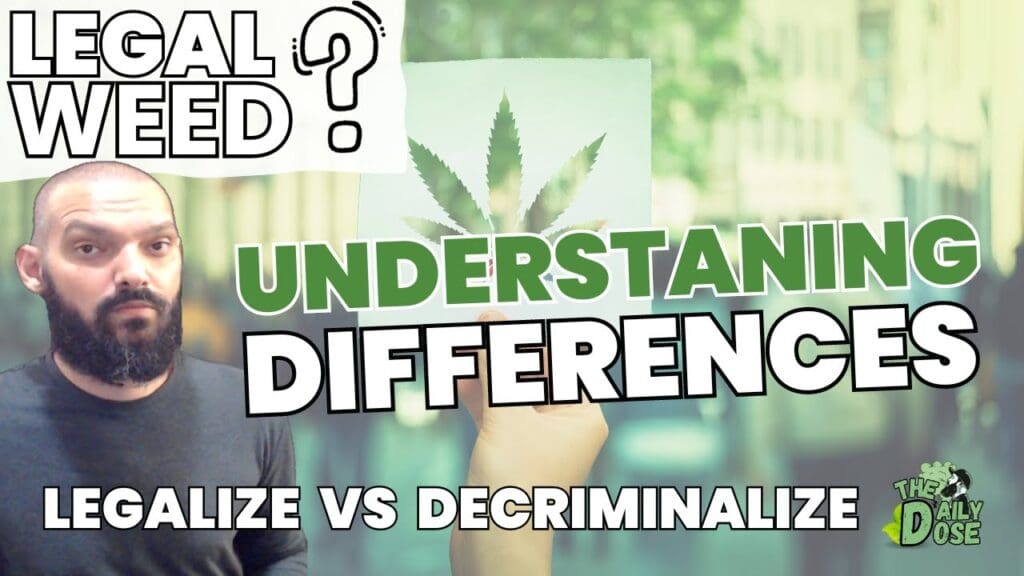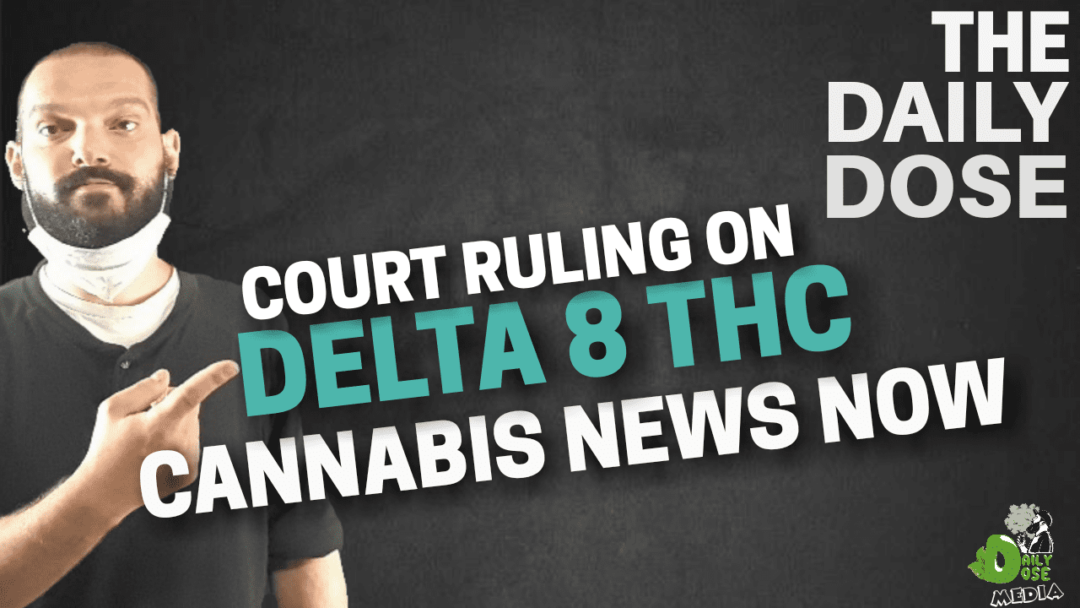Listen to the full episode here: The Daily Dose Podcast
Legal Weed Understanding The Differences Between The 2 Legislative Approaches
In My Own Words
Hello everyone like you I’ve wondered the difference between these two and I’ve weighed the pros and cons of each. As we sit today we as a nation are on the brink of massive changes in the cannabis market.
We as consumers should consider the pros and cons of both options to better understand what it may mean for a broader perspective long term.
Everyone has an opinion about which maybe better including your local law makers however in this episode I would like to weigh each of these and consider them at face value at the end I’ll give you my pick of which maybe best for now.

Introduction
As the global perspective on cannabis undergoes a transformative shift, the terms “legalization” and “decriminalization” are frequently invoked. This comprehensive exploration aims to unravel the key differences between these two approaches, shedding light on their implications for individuals, societies, and economies.
Legalization of Cannabis
Legalization entails the comprehensive approval of cannabis for various uses, from medicinal to recreational. This section delves into the regulatory framework, licensing processes, and the economic impact associated with the full legalization of cannabis.
The full legalization of cannabis represents a seismic shift in societal and economic paradigms. Transitioning from prohibition to a regulated market involves establishing a comprehensive regulatory framework to govern cultivation, distribution, and consumption.
Licensing processes become pivotal, requiring active engagement from businesses seeking legitimacy within the burgeoning industry. As a consequence, the economic impact is profound, with job creation, increased tax revenue, and a burgeoning cannabis market contributing to overall economic growth.
The regulatory framework serves as the bedrock for ensuring public safety, product quality, and adherence to legal standards, while licensing processes act as gatekeepers, carefully vetting entities entering the market. The economic ramifications of full legalization extend beyond the cannabis industry, influencing various sectors and providing governments with opportunities for strategic fiscal planning.

Decriminalization of Cannabis
Distinct from legalization, decriminalization involves a reduction in the legal penalties associated with cannabis possession, often treating it as a civil offense rather than a criminal one. Here, we examine the consequences of decriminalization, its impact on law enforcement priorities, and the potential benefits for social and racial justice.
Regulatory Approach
While both legalization and decriminalization represent shifts in cannabis policies, the regulatory approaches differ significantly. This section provides an in-depth analysis of the detailed regulations accompanying legalization and the enforcement changes characterizing decriminalization.
In delving into the intricacies of cannabis policy, a nuanced analysis of the detailed regulations accompanying legalization and the enforcement changes characterizing decriminalization reveals distinct pathways of governance. The comprehensive regulatory framework of legalization involves meticulous guidelines governing aspects such as cultivation, distribution, and sales, ensuring a structured and controlled market.
Conversely, decriminalization shifts the focus from punitive measures to reduced legal penalties, treating cannabis possession as a civil offense rather than a criminal one. This shift in enforcement strategy is pivotal, altering law enforcement priorities and fostering a climate where individuals caught with small amounts of cannabis face civil fines rather than criminal charges.
The active implementation of regulations in legalization and the recalibration of enforcement strategies in decriminalization collectively shape the operational landscape of cannabis governance, reflecting a dynamic interplay of legal, social, and law enforcement considerations.

Impact on Criminal Records
The consequences of cannabis-related offenses extend beyond legal penalties. Expungement initiatives in legalization and the reduction of criminal charges in decriminalization are pivotal aspects explored in this section, addressing the enduring effects on individuals.
The enduring effects on individuals stemming from cannabis-related criminal charges persist as a complex and multifaceted aspect of the broader cannabis policy landscape. As legalization initiatives increasingly include measures for expungement, individuals with prior convictions find a potential avenue for the removal or mitigation of the lingering impacts on their records.
However, the enduring effects are palpable, influencing various facets of life, from employment opportunities to housing and educational prospects. While efforts are made to rectify historical injustices through expungement, the long-lasting consequences of criminal charges highlight the importance of comprehensive cannabis policy reform that addresses both present and historical social disparities, ensuring equitable opportunities for all individuals affected by outdated and punitive laws.

Economic Considerations
The economic ramifications of cannabis policies are substantial. Legalization often leads to the creation of a burgeoning industry with economic growth and tax revenue, while decriminalization focuses on cost savings and economic relief. This section dissects the economic dynamics of both approaches.
The economic dynamics of cannabis policy, whether through legalization or decriminalization, unfold distinct pathways with varying implications. Full legalization catalyzes a robust industry, fostering economic growth, job creation, and generating substantial tax revenue.
It transforms cannabis into a legitimate commodity, attracting investment, and stimulating ancillary businesses. On the other hand, decriminalization, while alleviating the burden on the criminal justice system and reducing associated costs, may not generate the same economic windfall.
Its economic impact is more indirect, with cost savings in law enforcement and criminal justice, potentially redirected toward social programs. The economic nuances of these approaches reflect a broader societal discourse on balancing industry growth, public health, and social equity within the ever-evolving landscape of cannabis policy reform.

Social and Racial Justice
Cannabis policies intersect with broader issues of social and racial justice. Legalization attempts to address systemic disparities, while decriminalization is positioned as a step towards equity. This section navigates the ongoing challenges and disparities within these frameworks.
Despite the noble intentions of cannabis policy reform, ongoing challenges and disparities persist within the frameworks of legalization and decriminalization. As legalization endeavors to address systemic disparities by implementing social equity programs and expungement initiatives, hurdles emerge in ensuring these measures effectively reach marginalized communities disproportionately affected by the War on Drugs.
Concurrently, while decriminalization is positioned as a step towards equity by reducing criminal penalties, it may fall short of fully addressing the root causes of historical injustices. The active navigation of these challenges is crucial for policymakers, necessitating an adaptive approach that goes beyond legislative changes to encompass broader societal and economic initiatives, ensuring that the promises of equity and justice are realized in practice.

Public Opinion and Perception
Shifting public attitudes towards cannabis play a pivotal role in shaping policies. This section explores the interplay of political, social, and cultural factors, examining how public opinion influences the trajectory of both legalization and decriminalization.
The interplay of political, social, and cultural factors intricately weaves the narrative of cannabis policy reform, shaping the trajectory of both legalization and decriminalization. Politically, shifts in public opinion act as catalysts for legislative changes, prompting policymakers to respond to the evolving perspectives of their constituents.
Socially, the changing attitudes towards cannabis reflect a broader cultural transformation, challenging stigmas and fostering more nuanced discussions around drug policy. This societal shift not only influences legislative decisions but also shapes the implementation and acceptance of new policies.
The active engagement of the public, fueled by evolving cultural norms, plays a pivotal role in steering the course of cannabis policy, highlighting the dynamic relationship between the political realm, societal perceptions, and the cultural underpinnings that collectively mold the landscape of cannabis governance.

Global Perspectives
The approach to cannabis policies varies significantly on the global stage. This section provides an overview of international perspectives, the impact of globalization on policies, and the lessons that can be gleaned from different regions.
Pros and Cons of Legalization
Pros:
- Economic growth and job creation
- Tax revenue for public initiatives
- Reduced criminalization and associated social issues
Cons:
- Regulatory challenges and complexities
- Potential misuse and public health concerns
- Social implications and cultural shifts
Pros and Cons of Decriminalization
Pros:
- Reduction of criminal charges and associated penalties
- Social justice and decreased law enforcement focus
- Cost savings in the criminal justice system
Cons:
- Limited economic growth and job creation
- Regulatory gaps and potential misuse
- Ongoing disparities in law enforcement practices
Conclusion: Shaping the Future of Cannabis Policies
In conclusion, the key differences between the legalization and decriminalization of cannabis reflect a nuanced landscape of policies, regulations, and societal impacts. This exploration underscores the need for informed decision-making, recognizing the multifaceted nature of cannabis reform.
As societies grapple with these choices, a holistic approach that considers economic, social, and racial justice implications will be crucial for shaping the future of cannabis policies.
FAQs
How does legalization impact criminal records related to cannabis offenses?
Does decriminalization lead to the complete removal of penalties for cannabis possession?
What is the global perspective on cannabis policies, and are there successful models to learn from?
How does public opinion influence changes in cannabis policies?
Can both legalization and decriminalization coexist in the same jurisdiction?
Related Articles:
- Cannabis Edibles Guide For New Users
- Cannabis Legalization And Substance Use Patterns
- Delta 8 THC Legal Status Explained Now
- Drug Test Can You Pass Using HHC
- Pot Politics: Health and Personal Rights
Meet The Author





